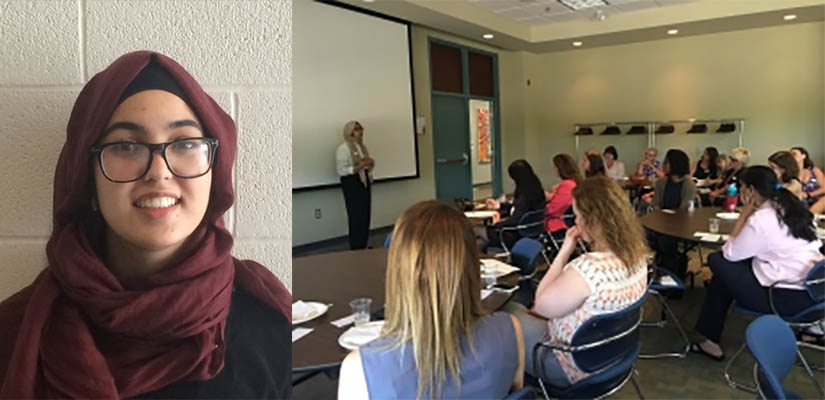Nawal Behih, 25, wins funding with a three minute pitch that could save lives. Engineering design student Nawal Behih won hundreds of dollars in three minutes with her stroke detection technology at a local pitch competition.
A year ago,l Behih never would have thought to start her own business.
"I don't usually like to be put on the spot," said the 25-year-old winner of Women Entrepreneurship's 2016 Quick Pitch Competition.
Behih's company HINT (Healthcare Innovation in Neurotechnology) is developing a wearable monitoring device for high-risk stroke patients. Their stroke detection device would be worn at night and wakes a patient up to receive treatment quickly — an important part of minimizing stroke's effects.
She was the youngest contestant this year, winning Best Business.
"It was really nerve wracking," she says.
Six contestants had three minutes each to pitch their business to a panel of judges, and a room of almost 50 community members.
"I really think that entrepreneurship is the key to prosperity for communities in a global economy," said Shelley McQuade, moderator for Hamilton's Women Entrepreneurship group.
This year's ideas ranged from education on end-of-life care, to an improved solution for dry eye disease.
"This is our fifth Quick Pitch Competition that we've done," said McQuade, who has been with the organization for four years. "It's an important opportunity for the ladies to tell their stories."
For Behih, it's a great story.
An international student from Algeria, Behih arrived in Hamilton in August. If it weren't for the community, she might've never tried. At McMaster she partnered with two entrepreneurship students to come up with an invention.
"They started looking into the number one cause of disabilities, and issues affecting the health sector," said Behih.
After reaching out to hospitals, they noticed a problem with high-risk stroke cases and their occurrences at night.
Getting treatment in time
Even after a first stroke is treated, the patient is still at a high-risk of suffering another in the days that follow. The short timeline for stroke treatment makes it even more difficult.
"You only have four and a half hours to receive treatment," said Behih, after which patients experience a loss in quality of life, and even death. These secondary strokes can occur while individuals are asleep, and pose a serious problem for doctors that then can't get to the patient in time.
"It's too late if you woke up in the middle of the night and you don't know when you had the stroke," said Behih. "Doctors used to feel helpless."
A gracious winner, she is quick to note how the Hamilton community itself contributed to her success.
"I love the atmosphere. It's really amazing to find a lot of women coming and sharing their ideas and wanting to get to meet others and see what other women are doing. It makes me very proud to be honest," she said.
"At the same time, it makes me want to do more."
Source: CBC-Hamilton - 27 juin 2016





